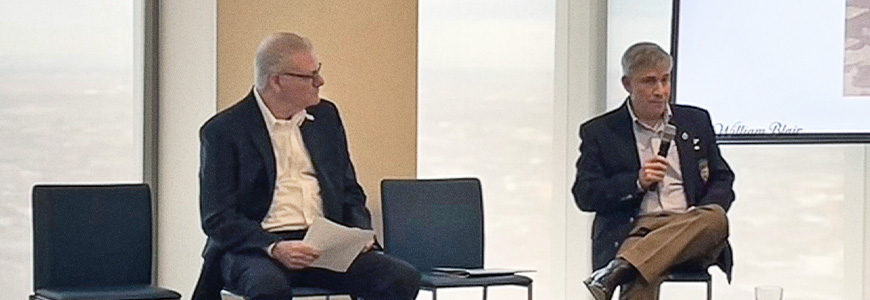
Retired U.S. Air Force Col. Mark Vlahos shared his vast leadership experiences acquired during his 29-year career in the military—from commanding a C-130 squadron during the invasion of Afghanistan to being an aircrew member of the prestigious Presidential Flight Support team—at William Blair’s annual Veterans Day celebration.
In commemorating Veterans Day, Vlahos reminded the audience that duty, honor, and service are the ideals of those who serve their country.
“We basically wrote a blank check on our life, if needed, in the defense of our country,” he told the audience. “Military service is a calling. War, combat is serious business. It should always be the last resort before diplomacy fails. It’s not something that you relish. People who write that blank check have a bond of trust, friendship that lasts for life whether you’re Army, Navy, Air Force, Marines, or Coast Guard. That’s what military service does for veterans.”
He recognized and thanked the 45 veteran members of William Blair’s Veterans' Alliance, a business resource group at the firm and the host of the 8th annual colleague event held on November 9.
Vlahos, who now resides in Texas, retired from the U.S. Air Force in 2011 after serving in a wide range of operational flying and staff assignments, including command of a C-130 squadron in combat and vice wing commander of the 314th Airlift Wing at Little Rock Air Force Base. At the time, Little Rock Air Force Base was the largest C-130 wing in the world. C-130s are one of the most famous and flexible military aircrafts in the world and able to perform many missions, from combat deliveries and aerial refueling to special operations and disaster relief.
Vlahos, now author and World War II historian, comes from a family of military veterans. He is a Virginia Tech alumnus and holds master’s degrees from Webster University and the Industrial College of the Armed Services.
Leadership, Risk-Management Lessons
Vlahos shared with colleagues his insights on leadership and risk-management through the lens of his long military career and experiences in war. Those included the time he served as a squadron commander at a Middle East military base in Muscat, Oman, beginning in June 2001. Muscat was a remote duty assignment that became the focus of U.S. Air Force operations when the United States invaded Afghanistan in the fall of 2001 following 9/11. Afghanistan, a country accessible only by land or air, was just a four-hour flight from Muscat.
“Immediately our mission changed from what we were doing to Operation Enduring Freedom—the global war of terrorism officially began,” Vlahos said. “My squadron doubled in size and people just kept coming in.”
Before long, as a middle-ranked field officer of lieutenant colonel, Vlahos was in charge of caring, feeding, and providing safety for 1,500 people. That included setting up a tent city, a cargo hub, two hospitals along with serving as squadron commander.
“I was tired, overworked and called up my boss and said you’ve got to get a full bird colonel in here to manage building this tent city, the cargo hub operations so I can concentrate on my real job of safety flying of a mission that was rapidly changing into flying combat missions into Afghanistan,” Vlahos said.
“So the lesson, when you need help from the firm don’t be ashamed to ask for it when you’re overwhelmed.”
Owning the Night
One of his proudest moments while serving in Afghanistan was leading crews to fly and land planes at night without lights—made possible with night vision goggles. These high-tech instruments, which were relatively new to Air Force operations then, use the moon to illuminate the field of vision for the aircrew. At the time, only a few pilots and navigators were qualified to use them.
In fact, Vlahos led one of the first night C-130 crews into Afghanistan after 9/11. As part of the initial military invasion, Vlahos’s squadron was ordered to pick up 58 U.S. Marines who had arrived in Pakistan then fly them into Afghanistan and return to Oman. The eight-hour flight mission was to be conducted without lights on the airplane or on the ground. While it was a dangerous mission and the risks were high, he said, it was a success with the availability of night vision goggles for all—a change Vlahos championed.
“That was a game-changer for the United States Air Force. We could own the night.”’
Vlahos said that mission taught him a lot about risk management. And while the risks in the military are different than what colleagues may face in their daily work lives, one valuable lesson he learned and key to any organization is building trust in your team members.


